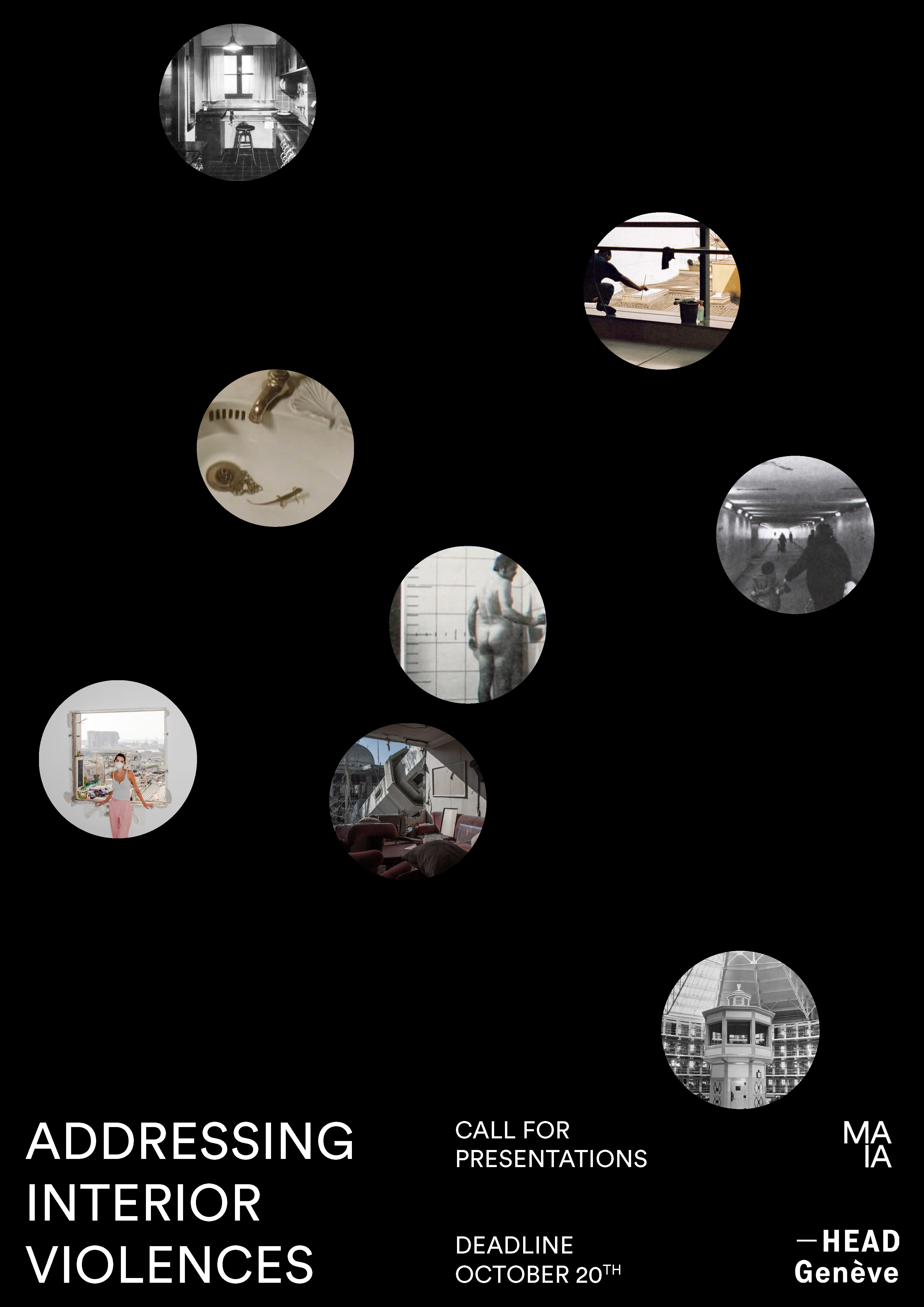- The school
- Studies and Research
- BACHELOR
- MASTER
- DOCTORATE
- RESEARCH
- TRANSDISCIPLINARITY
- POOLS
- CONTINUING EDUCATION
- Continuing education 2025-2026
- Artificial Intelligence, initiation
- Artificial Intelligence, Advanced
- Artificial intelligence open-source, ComfyUI
- Creative coding
- Engage with drawing
- Frame-by-frame animation
- Immersive Mapping : Unreal Engine & MadMapper
- 3D exhibition modeling in SketchUp
- 3D modeling, Blender
- Point cloud scanning
- Documentary podcast
- Serious games
- For students
- Studying at the HEAD
- InfoLab
- Living in Geneva
- Tuition fees and sholarship
- Library
- Regulations and instructions
- Projects
- Events
- Press
- Partnerships and prizes
Addressing Interior Violences
Call for presentation
The Department of Interior Architecture at HEAD – Genève explores the role of interior spaces in shaping contemporaneity. To that extent, it organizes a series of reflections and interventions that aim to learn, question and visibilize how interiors play a key role in the construction of violence for inhabiting bodies and subjectivities.
Deadline for proposals: October 20, 2025
Dates of the symposium: February 23 & 24, 2026
Theme
To address spatial violence from within a school of interior architecture is to acknowledge interior spaces as more than politically neutral backgrounds. They should be understood not as mere decors for the everyday lives of predefined identities, but as materially situated conditions that actively participate in shaping social and political interactions. Addressing Interior Violences follows Michel Foucault’s reflections in Discipline and Punish (1975) by considering interior architecture as a set of biopolitical techniques of control over bodies and subjectivities – techniques that uphold the construction of the normal subject: that is, the considered-able, white, young, human, bourgeois, heterosexual, male subject. At the same time, it also questions its mirror image: the spatial production of the monstrous, excluded, dehumanized one. Building on the writings of Lennard J. Davis (2002), this open call seeks to interrogate the role of interior spaces in perpetuating power structures organized around the modern notion of normalcy. Divided into three categories, it welcomes proposals that have the following collective aims:
- Learn the ways in which the discipline of interior architecture has historically participated in the exclusion of minoritized bodies – both human and non-human.
- Question how contemporary interior material conditions can contribute to the perpetuation of power dynamics over certain bodies in specific contemporary contexts – and, conversely, how they might serve as tools of negotiation and resistance.
- Visibilize practices and projects that have developed methodologies aimed at overcoming these violences.
Toward Emancipatory Futures
In light of today’s geopolitical context, marked by pervasive international violence against specific bodies and subjectivities, Addressing Interior Violences stresses the urgent responsibility of interior architecture to pursue the work of many to acknowledge and deconstruct its own complicities. Engaging with postcolonial, feminist, queer and ecological perspectives seems essential, not only to understand these histories, but also to reorient the discipline toward more just and emancipatory futures. We recognize that voices marginalized by structures of gender, sexuality, race, class or ability have historically been excluded from the discipline. This call therefore explicitly encourages submissions from those positions, which are considered central to the discussion.
----------------------------------
ACCESS COMPLETE INFORMATION AND APPLICATION PROCEDURES HERE
----------------------------------

Addressing Interior Violences - Call for presentations
© Unknown. Prison inspired by Bentham’s Panopticon [photograph]. Getty Images. Kira, A. (1960). Bathroom [photograph]. Millen, L. (unknown). Anne Thorne with son. From MATRIX (Collective) (1984). Making Space: Women and the Man-Made Environment [photograph]
© Unknown. Prison inspired by Bentham’s Panopticon [photograph]. Getty Images. Kira, A. (1960). Bathroom [photograph]. Millen, L. (unknown). Anne Thorne with son. From MATRIX (Collective) (1984). Making Space: Women and the Man-Made Environment [photograph]
